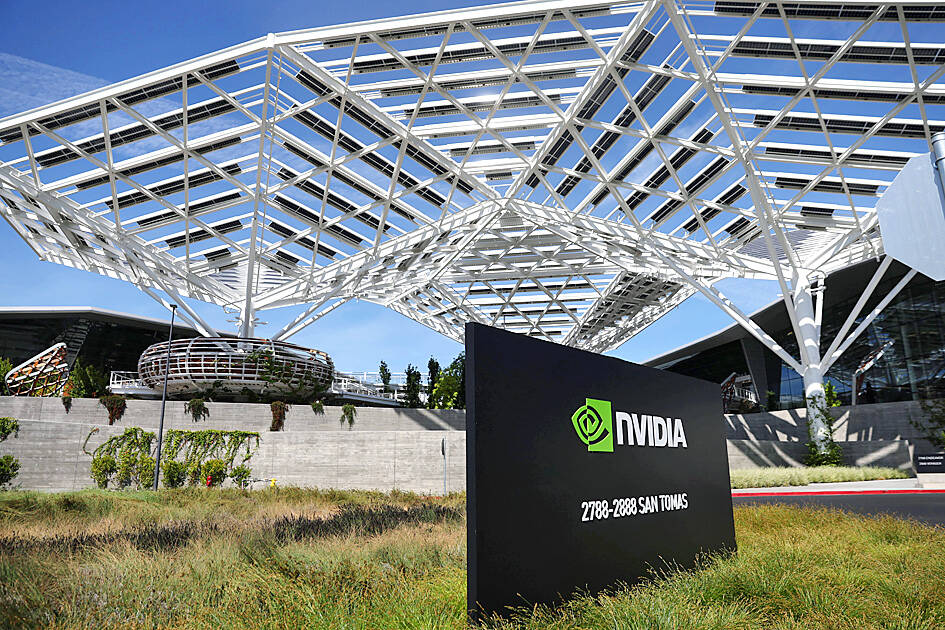Nvidia Corp said it has been given licenses to provide support to US customers in China and to allow it to complete development work there on its artificial-intelligence chips, a small concession in Washington’s latest push to shut off that country’s access to advanced technology.
The US government has authorized the company to “perform exports needed to provide support for US customers of A100 through March 1, 2023,” a company filing on Thursday said.
Nvidia has also been granted permission to transfer necessary technology to China for the development of its upcoming H100 products. These exports are authorized to be conducted through the US chipmaker’s Hong Kong facility through Sept. 1 next year, it said.

Photo: AFP
The statement did little to assuage concerns laid out in Nvidia’s warning on Wednesday that the restrictions might cost it US$400 million in revenue this quarter. The time limitations laid out in Thursday’s filing reflect the US government’s determination to clamp down on access to technology it deems could be misused for military purposes.
For Nvidia, which relies on China for about one-quarter of its revenue, the temporary easing likely does not allow it to sell the chips to some of the biggest buyers of that type of technology — Chinese hyperscalers, companies that operate the biggest data centers full of server chips.
What the easing does do is crucially allow it to use Chinese engineers and operations to complete development of its H100 chip, its latest piece of technology for the market.
“If Nvidia is unable to complete H100 development, the knock-on effects would likely be much larger than the direct revenue exposure in the current quarter,” Cowen & Co analyst Matt Ramsay wrote in a report.
“We are working with our customers in China to satisfy their planned or future purchases with alternative products and may seek licenses where replacements aren’t sufficient,” the company said on Wednesday. “The only current products that the new licensing requirement applies to are A100, H100 and systems such as DGX that include them.”
US companies are under increasing government scrutiny over their dealings with China, the largest market for semiconductors, amid a growing rivalry between the world’s two largest economies.
The US is trying to limit China’s access to technology, saying Beijing represents a security risk. China, in turn, is trying to build its own domestic capabilities to make itself less dependent on the US, which still dominates the design and development of the crucial technology.
Advanced Micro Devices Inc on Wednesday said that it received a similar notice from the government, although it does not expect a significant impact.
“At this time, we do not believe that shipments of MI100 integrated circuits are impacted by the new requirements,” the company said in a separate statement.

The US dollar was trading at NT$29.7 at 10am today on the Taipei Foreign Exchange, as the New Taiwan dollar gained NT$1.364 from the previous close last week. The NT dollar continued to rise today, after surging 3.07 percent on Friday. After opening at NT$30.91, the NT dollar gained more than NT$1 in just 15 minutes, briefly passing the NT$30 mark. Before the US Department of the Treasury's semi-annual currency report came out, expectations that the NT dollar would keep rising were already building. The NT dollar on Friday closed at NT$31.064, up by NT$0.953 — a 3.07 percent single-day gain. Today,

‘SHORT TERM’: The local currency would likely remain strong in the near term, driven by anticipated US trade pressure, capital inflows and expectations of a US Fed rate cut The US dollar is expected to fall below NT$30 in the near term, as traders anticipate increased pressure from Washington for Taiwan to allow the New Taiwan dollar to appreciate, Cathay United Bank (國泰世華銀行) chief economist Lin Chi-chao (林啟超) said. Following a sharp drop in the greenback against the NT dollar on Friday, Lin told the Central News Agency that the local currency is likely to remain strong in the short term, driven in part by market psychology surrounding anticipated US policy pressure. On Friday, the US dollar fell NT$0.953, or 3.07 percent, closing at NT$31.064 — its lowest level since Jan.

The New Taiwan dollar and Taiwanese stocks surged on signs that trade tensions between the world’s top two economies might start easing and as US tech earnings boosted the outlook of the nation’s semiconductor exports. The NT dollar strengthened as much as 3.8 percent versus the US dollar to 30.815, the biggest intraday gain since January 2011, closing at NT$31.064. The benchmark TAIEX jumped 2.73 percent to outperform the region’s equity gauges. Outlook for global trade improved after China said it is assessing possible trade talks with the US, providing a boost for the nation’s currency and shares. As the NT dollar

The Financial Supervisory Commission (FSC) yesterday met with some of the nation’s largest insurance companies as a skyrocketing New Taiwan dollar piles pressure on their hundreds of billions of dollars in US bond investments. The commission has asked some life insurance firms, among the biggest Asian holders of US debt, to discuss how the rapidly strengthening NT dollar has impacted their operations, people familiar with the matter said. The meeting took place as the NT dollar jumped as much as 5 percent yesterday, its biggest intraday gain in more than three decades. The local currency surged as exporters rushed to